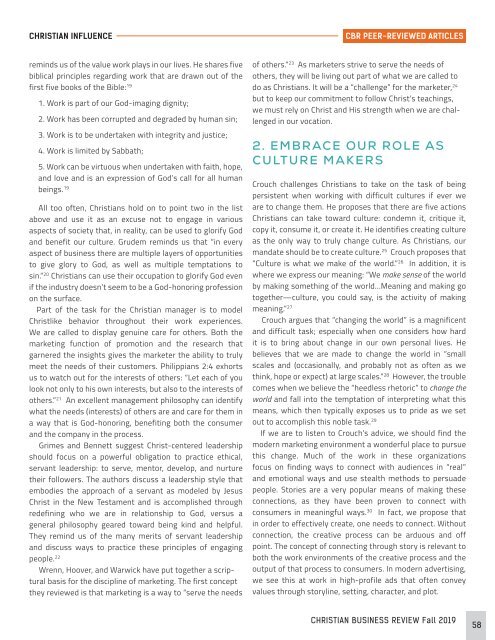Christian Business Review 2019: Workplace Practices That Glorify God (Issue 8)
Create successful ePaper yourself
Turn your PDF publications into a flip-book with our unique Google optimized e-Paper software.
CHRISTIAN INFLUENCE<br />
CBR PEER-REVIEWED ARTICLES<br />
reminds us of the value work plays in our lives. He shares five<br />
biblical principles regarding work that are drawn out of the<br />
first five books of the Bible: 19<br />
1. Work is part of our <strong>God</strong>-imaging dignity;<br />
2. Work has been corrupted and degraded by human sin;<br />
3. Work is to be undertaken with integrity and justice;<br />
4. Work is limited by Sabbath;<br />
5. Work can be virtuous when undertaken with faith, hope,<br />
and love and is an expression of <strong>God</strong>’s call for all human<br />
beings. 19<br />
All too often, <strong>Christian</strong>s hold on to point two in the list<br />
above and use it as an excuse not to engage in various<br />
aspects of society that, in reality, can be used to glorify <strong>God</strong><br />
and benefit our culture. Grudem reminds us that “in every<br />
aspect of business there are multiple layers of opportunities<br />
to give glory to <strong>God</strong>, as well as multiple temptations to<br />
sin.” 20 <strong>Christian</strong>s can use their occupation to glorify <strong>God</strong> even<br />
if the industry doesn’t seem to be a <strong>God</strong>-honoring profession<br />
on the surface.<br />
Part of the task for the <strong>Christian</strong> manager is to model<br />
Christlike behavior throughout their work experiences.<br />
We are called to display genuine care for others. Both the<br />
marketing function of promotion and the research that<br />
garnered the insights gives the marketer the ability to truly<br />
meet the needs of their customers. Philippians 2:4 exhorts<br />
us to watch out for the interests of others: “Let each of you<br />
look not only to his own interests, but also to the interests of<br />
others.” 21 An excellent management philosophy can identify<br />
what the needs (interests) of others are and care for them in<br />
a way that is <strong>God</strong>-honoring, benefiting both the consumer<br />
and the company in the process.<br />
Grimes and Bennett suggest Christ-centered leadership<br />
should focus on a powerful obligation to practice ethical,<br />
servant leadership: to serve, mentor, develop, and nurture<br />
their followers. The authors discuss a leadership style that<br />
embodies the approach of a servant as modeled by Jesus<br />
Christ in the New Testament and is accomplished through<br />
redefining who we are in relationship to <strong>God</strong>, versus a<br />
general philosophy geared toward being kind and helpful.<br />
They remind us of the many merits of servant leadership<br />
and discuss ways to practice these principles of engaging<br />
people. 22<br />
Wrenn, Hoover, and Warwick have put together a scriptural<br />
basis for the discipline of marketing. The first concept<br />
they reviewed is that marketing is a way to “serve the needs<br />
of others.” 23 As marketers strive to serve the needs of<br />
others, they will be living out part of what we are called to<br />
do as <strong>Christian</strong>s. It will be a “challenge” for the marketer, 24<br />
but to keep our commitment to follow Christ’s teachings,<br />
we must rely on Christ and His strength when we are challenged<br />
in our vocation.<br />
2. EMBRACE OUR ROLE AS<br />
CULTURE MAKERS<br />
Crouch challenges <strong>Christian</strong>s to take on the task of being<br />
persistent when working with difficult cultures if ever we<br />
are to change them. He proposes that there are five actions<br />
<strong>Christian</strong>s can take toward culture: condemn it, critique it,<br />
copy it, consume it, or create it. He identifies creating culture<br />
as the only way to truly change culture. As <strong>Christian</strong>s, our<br />
mandate should be to create culture. 25 Crouch proposes that<br />
“Culture is what we make of the world.” 26 In addition, it is<br />
where we express our meaning: “We make sense of the world<br />
by making something of the world…Meaning and making go<br />
together—culture, you could say, is the activity of making<br />
meaning.” 27<br />
Crouch argues that “changing the world” is a magnificent<br />
and difficult task; especially when one considers how hard<br />
it is to bring about change in our own personal lives. He<br />
believes that we are made to change the world in “small<br />
scales and (occasionally, and probably not as often as we<br />
think, hope or expect) at large scales.” 28 However, the trouble<br />
comes when we believe the “heedless rhetoric” to change the<br />
world and fall into the temptation of interpreting what this<br />
means, which then typically exposes us to pride as we set<br />
out to accomplish this noble task. 29<br />
If we are to listen to Crouch’s advice, we should find the<br />
modern marketing environment a wonderful place to pursue<br />
this change. Much of the work in these organizations<br />
focus on finding ways to connect with audiences in “real”<br />
and emotional ways and use stealth methods to persuade<br />
people. Stories are a very popular means of making these<br />
connections, as they have been proven to connect with<br />
consumers in meaningful ways. 30 In fact, we propose that<br />
in order to effectively create, one needs to connect. Without<br />
connection, the creative process can be arduous and off<br />
point. The concept of connecting through story is relevant to<br />
both the work environments of the creative process and the<br />
output of that process to consumers. In modern advertising,<br />
we see this at work in high-profile ads that often convey<br />
values through storyline, setting, character, and plot.<br />
CHRISTIAN BUSINESS REVIEW Fall <strong>2019</strong><br />
58 2














